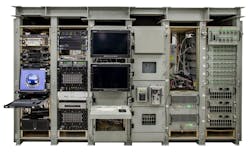Navy asks Lockheed Martin to provide submarine electronic warfare (EW) and digital signal processing
WASHINGTON – Submarine combat systems experts at Lockheed Martin Corp. will design and test U.S. Navy AN/BLQ-10 electronic warfare (EW) systems for Navy submarines under terms of an $43.4 million order announced Wednesday.
Officials of the Naval Sea Systems Command in Washington are asking the Lockheed Martin Rotary and Mission Systems segment in Syracuse, N.Y., for the design, prototyping, and qualification testing of submarine electronic warfare equipment.
The order involves a modification to a potential $970.1 million 10-year contract announced in February 2019 for Lockheed Martin to design, upgrade, and support the AN/BLQ-10 submarine EW system. This order could increase the contract's total value so far to $111.7 million.
The AN/BLQ-10 provides automatic detection, classification, localization, and identification of potentially hostile radar and communications signals at sea.
Related: The coming of age of artificial intelligence
The AN/BLQ-10 helps Virginia-, Los Angeles-, and Seawolf-class fast-attack submarines, Ohio-class conventional guided-missile submarines, and future Columbia-class ballistic-missile submarines detect enemy radar and communications. It is not for existing Ohio-class ballistic-missile submarines.
The AN/BLQ-10 does digital signal processing from the submarine’s imaging mast or periscope when the boat is at periscope depth. It provides threat warning to avoid counter-detection and collision; determines the number and location of targets for subsequent prosecution; and conducts intelligence, surveillance, and reconnaissance (ISR) to support the fleet or battle group.
The program is adopting an open-architecture, incremental development process that fields hardware and software technology insertions every two years. The AN/BLQ-10 blends modular interoperable systems that adhere to open standards with published interfaces.
The system's first technology insertion (TI) in 2008 added a subsystem to intercept some low-probability-of-intercept radar signals. Fielded upgrades from the 2010 technology insertions updated commercial off-the-shelf (COTS) processors and displays, and Improved Communications Acquisition and Direction Finding (ICADF) system.
Related: Electronic warfare: all systems go
For TI-20, Lockheed Martin built an upgraded AN/BLQ-10 for Virginia- and Columbia-class submarine new construction, and in-service Virginia-class modernization.
TI-22 work upgraded AN/BLQ-10 systems for in-service Los Angeles- and Seawolf-class attack submarines, as well as for Ohio-class conventional missile submarines. TI-24 work builds an upgraded AN/BLQ-10 for Virginia-class and Columbia-class new construction, as well as for in-service Virginia-class modernization.
On this order Lockheed Martin will do the work in Syracuse, N.Y., and should be finished by February 2029. For more information contact Lockheed Martin Rotary and Mission Systems online at www.lockheedmartin.com/en-us/who-we-are/business-areas/rotary-and-mission-systems.html.
